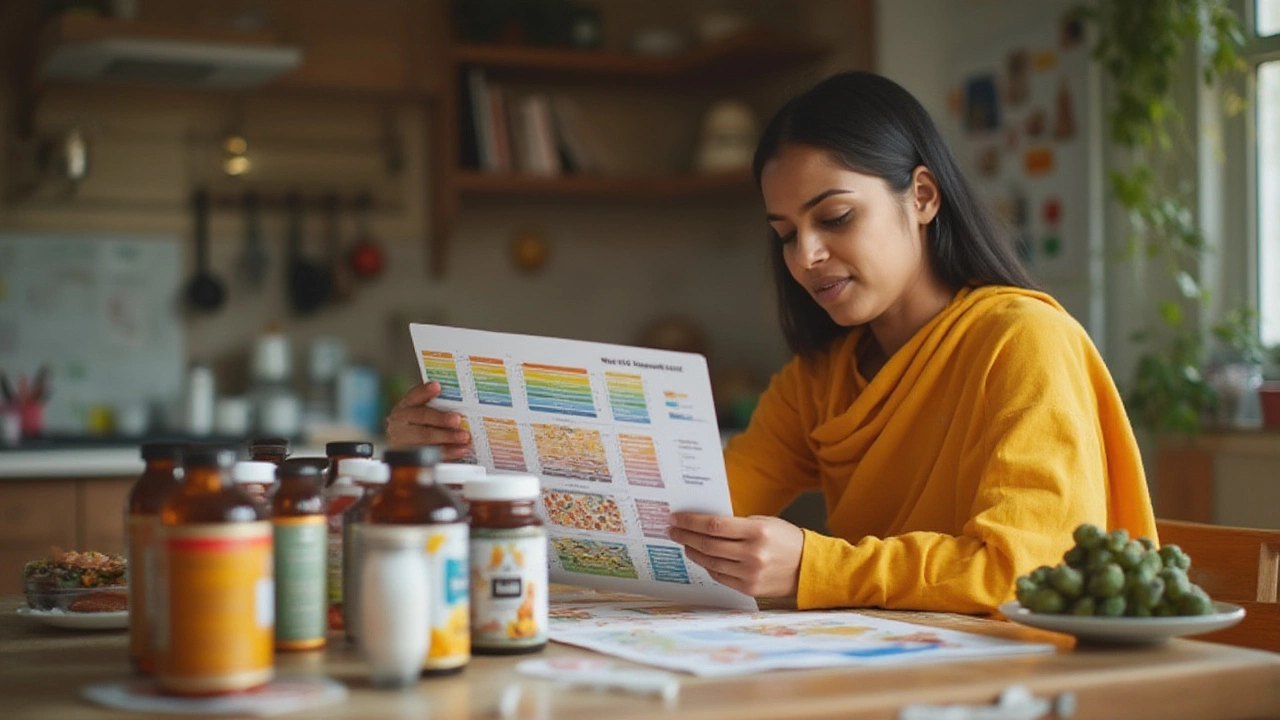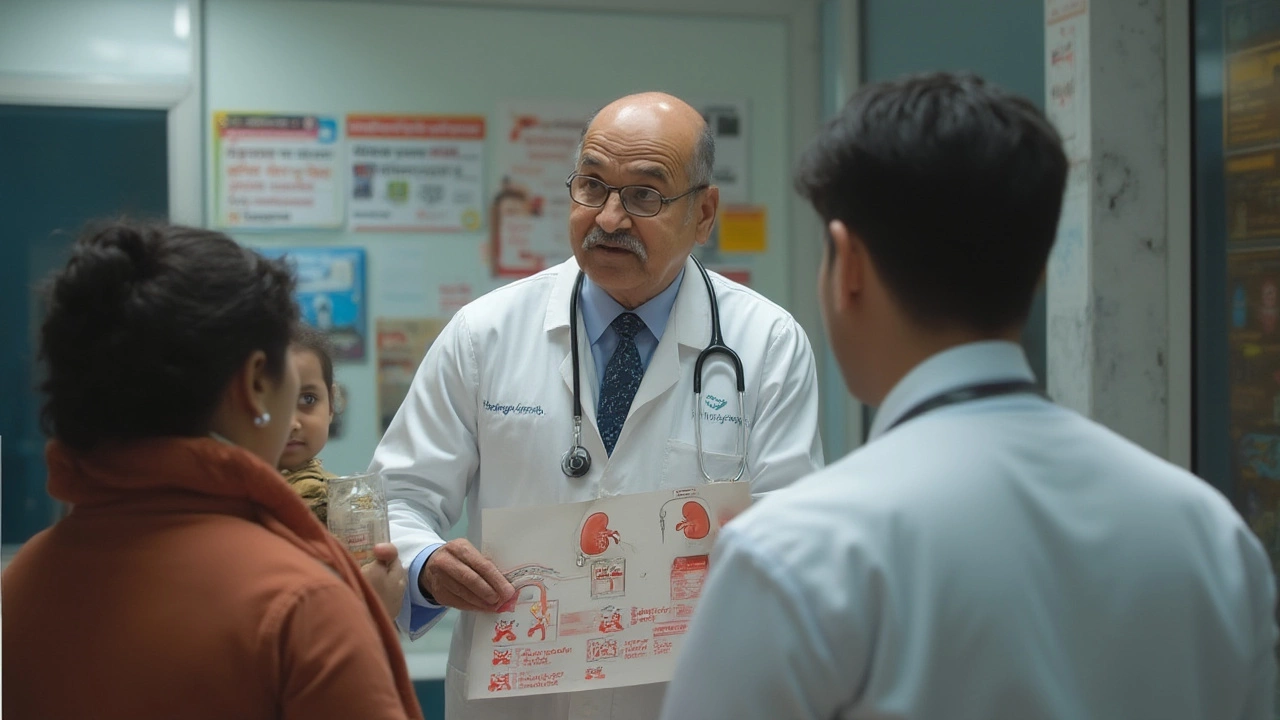
- Jul, 28 2025
- 0
How many people do you know who take vitamins every morning without thinking twice? Most of us pop our daily multivitamin assuming we’re boosting our health. But not so fast—your kidneys might have a different opinion. While our bodies need vitamins, there’s a twist: some can build up to dangerous levels or put heavy stress on our kidneys, especially if you overdo it or have kidney problems already. That’s not just talk—Australian hospital admissions from supplement overuse have been climbing, with kidney problems being one of the top concerns. Feeling surprised yet? Let’s untangle how these tiny pills impact your renal system and what you actually need to watch out for.
How Vitamins Are Processed in the Kidneys
Before we point fingers at any specific vitamins, let’s break down what actually happens inside your body after you swallow that vitamin tablet. Your kidneys are basically the body’s filter system, sifting out waste, toxins, and extra amounts of nutrients—including some vitamins and minerals—so nothing dangerous builds up. They do their job tirelessly, filtering about 180 liters of blood every day. Now, not all vitamins act the same way in your system. Fat-soluble vitamins (like A, D, E, and K) get stored in your body tissues, while water-soluble ones (like C and the B group) usually get flushed out through your pee if you don’t need them right away.
Here’s the catch: if you ingest high doses, your kidneys have to work overtime to get rid of those extra water-soluble vitamins. For fat-soluble types, the risk comes mainly from them piling up quietly over time, often completely unnoticed until there’s a problem. Ever heard of someone taking massive doses of vitamin D for bone health only to end up with kidney stones or even kidney failure? It happens, and it’s not as rare as you’d hope. So kidneys aren’t just bystanders in your supplement journey—they’re the ones taking the hit if you go overboard.
It’s not just pills from the pharmacy, either. Some energy drinks, protein powders, or “detox” teas you’ll find in Sydney health stores are loaded with added vitamins. Mix that with a heavy dose of processed food “fortified” with vitamins, and suddenly you’ve got a perfect storm for your kidneys. That’s why understanding the connection between what you swallow and how your body handles it is crucial before you go chasing the next health trend.
Here’s a table with some of the most commonly consumed vitamins and how they’re processed:
| Vitamin | Type | Excess Removed By Kidneys? | Common Sources |
|---|---|---|---|
| Vitamin C | Water-soluble | Yes | Citrus fruits, supplements |
| Vitamin B6 | Water-soluble | Yes | Fish, potatoes, supplements |
| Vitamin D | Fat-soluble | No (Stored in body) | Fish, dairy, supplements |
| Vitamin A | Fat-soluble | No (Stored in body) | Liver, carrots, supplements |
| Vitamin E | Fat-soluble | No (Stored in body) | Nuts, oils, supplements |
Notice the pattern? Water-soluble vitamins usually get excreted—if your kidneys can handle the load. Fat-soluble ones can silently build up, hiding out in your tissues for months or years.
Which Vitamins Are Tough on Your Kidneys?
This is what every supplement fan wants to know. If you look up “vitamins and kidney damage,” you get a confusing jumble of warnings and reassurances. Here’s where things get real: not all vitamins are equally risky. Let’s talk specifics.
Vitamin D is probably the biggest troublemaker when it comes to kidneys. Yes, it's needed for bone health and immunity, but too much can ramp up your blood calcium, leading to kidney stones or even kidney calcification—serious stuff. In Sydney, doctors have reported more young adults popping mega-doses of vitamin D due to online health trends, not realizing they're flirting with danger if they go above 4000 IU per day for months on end.
Vitamin C might seem harmless—after all, it’s just orange juice, right? Here’s the twist: high doses (above 2000 mg/day) can lead to a buildup of oxalate. This can lead to stones or worsen kidney function, especially if you have pre-existing kidney issues. Even so-called “immunity shots” at trendy cafes can contain several times the recommended daily intake. When your body tries to flush all that extra vitamin C, the oxalate combines with calcium and forms stones—painful and potentially dangerous.
Vitamin A is another troublemaker if you’re heavy on supplements or love liver dishes (yep, that old-school snack in some Aussie homes). It’s slow, silent, and toxic in high amounts, building up in your liver and then spilling over to damage your kidneys among other organs. Symptoms usually show up too late—think headache, confusion, and bone pain—by the time the damage is done. You really don’t need extra vitamin A unless your doctor says so.
B6 and B12 might sound like safe bets—after all, they’re water-soluble, right? But ultra-high-dose vitamin B6 supplements (think 100-200 mg daily for months) can actually cause nerve problems and place extra strain on your kidneys. B12 is a little safer, but there’s emerging research saying repeated mega-dosing could alter kidney function, especially in people with already reduced function. A big 2023 study from Melbourne showed older adults with chronic kidney disease had higher risks when taking frequent high-dose B vitamins.
Ever heard of niacin (vitamin B3)? It’s sometimes used to lower cholesterol, but too much can inflame and damage your kidneys. The risks get worse if you’re taking other meds that stress the renal system, like painkillers or certain blood pressure drugs.
Even vitamin E, usually considered safe, might increase bleeding risk and burden the kidneys if taken in excessive amounts for a long time. The National Kidney Foundation actually recommends not exceeding the regular dose in supplements unless a doctor says so.
Some vitamins aren’t too risky until you combine them. For example, taking large doses of vitamin D and calcium at the same time can trigger kidney stones much faster, especially if you’re not drinking enough water or already have mild renal issues.

Who Should Be Extra Careful?
If you’re reading this and feeling nervous, don’t panic. Not everyone has the same risk, but some people do need to be double-cautious. People with a history of kidney stones, chronic kidney disease (CKD), diabetes, or high blood pressure already have organs working harder. For them, even moderate supplement doses might turn out to be dangerous.
Australians over 60 should also take note—aging naturally reduces kidney function, while at the same time many older adults are encouraged to “keep up their vitamin D” or add a multivitamin. That’s a recipe for surprises if you don’t ask your doctor to check your kidney numbers before starting anything new. In fact, the kidney health check is sometimes forgotten in general practice, making those silent injuries more likely.
People who love high-protein diets or go big on gym supplements (hello, Sydney fitness crowd) are also at higher risk. Many pre-workout or protein powders are fortified with B vitamins, vitamin C, and sometimes D. Stack those with your breakfast multivitamin, and you could triple or quadruple your intake without realizing it. The kidney clinics in New South Wales have seen a consistent rise in younger patients presenting with kidney stones who mention heavy supplement use in their histories.
Here’s a quick list of red flags for reconsidering your supplement routine:
- History of kidney stones or chronic kidney issues
- Already taking blood pressure or diabetes medication
- Following high-dose vitamin regimens from online influencers
- Consuming protein powders or fortified foods daily
- Rarely or never checking with your GP before starting new supplements
If these sound familiar, you might want to rethink your routine and check with a healthcare pro—simple as that.
How to Take Vitamins Safely for Kidney Health
You don’t have to fear vitamins, but you do have to treat them with more respect than the average over-the-counter “wellness booster” pitch suggests. Keeping your kidneys happy is all about moderation and awareness. Here’s how to play it safe:
- Get tested: If you’ve never had a kidney function test and you regularly take supplements, book one. It’s a simple blood and urine check that tells you how well your kidneys are doing the job.
- Know your recommended daily intake (RDI): In Australia, the RDI for vitamin C is about 45 mg for adults; for vitamin D, it’s usually 400-800 IU. Stay close to those numbers if your kidneys are healthy. Only go above if your doctor says so after testing your blood levels.
- Check food sources first: You’re almost always better off getting vitamins from food. Food-based vitamins are absorbed more slowly and rarely cause overdose issues. Plus, you get all the other stuff your body craves—fiber, antioxidants, and other nutrients that help kidney function, not just pile on more work.
- Watch for hidden sources: Herbal teas, protein bars, even some bottled juices in Aussie supermarkets are fortified. It’s easy to overlook extra vitamin intake from these sources.
- Avoid trendy mega-dosing: There’s no proof that taking “immune-boosting” or “anti-fatigue” vitamin mega-doses actually works for healthy people—in fact, it can backfire. Kidney specialists in Sydney have treated everything from muscle cramps to hospital-grade kidney injuries thanks to social media supplement fads.
- Hydrate: Water helps your kidneys flush out any excess. If you take even regular doses of water-soluble vitamins, pair them with plenty of water—especially on hot summer days in Australia.
- Consult before combining: Always talk to a doctor or registered dietitian before mixing multiple supplements, combining with prescription meds, or making big changes. Supplements can interact with each other, meds, or underlying health conditions in ways you wouldn’t expect.
Here’s one myth that needs busting: “You can’t overdose on vitamins.” That’s just plain wrong. Both water- and fat-soluble vitamins can pile up, especially since some are snuck into foods and drinks without much fanfare. Even if you don’t have kidney trouble, giving your organs extra work day in, day out isn’t exactly kind.
There’s no need to chuck out your entire supplement shelf, but topping up where you’re actually deficient is a much smarter (and safer) move than jumping on the latest influencer hype. Your kidneys will thank you for it every single day.
If you’re serious about protecting your kidneys, keep tabs on your vitamin intake, especially supplements. They’re helpful only when you really need them—and only when you use them right.
Nikhil Verma
I'm a dedicated physician with a passion for exploring the intricacies of medicine, focusing on the unique healthcare challenges in India. I spend much of my spare time writing articles aimed at improving public understanding of health issues. Balancing my clinical practice and writing allows me to reach a wider audience, sharing insights and fostering a deeper appreciation for medical advancements. I derive immense satisfaction from both treating patients and engaging with readers through my writing.